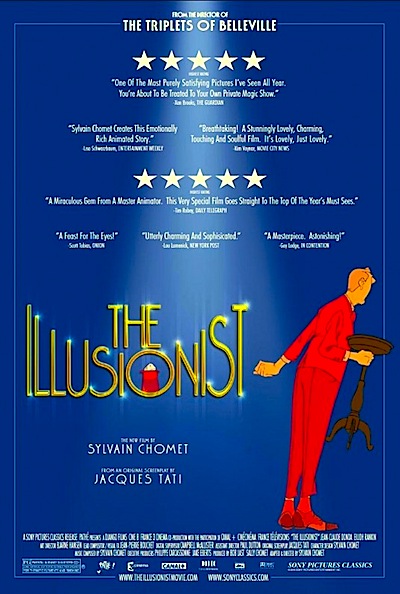By Joe Bendel. He was France’s favorite uncle, “Monsieur Hulot.” Indeed, the gentle but ever so sly physical comedy of Jacques Tati enchanted audiences the world over in classic Hulot films, like Mon Oncle and Play Time. However, Tati would have taken on a new role as a father figure in a screenplay he completed yet chose not to realize on film. With the blessings of his estate, renowned animator Sylvain Chomet sensitively adapted Tati’s unproduced script as the pitch-perfect The Illusionist, which opened Christmas Day in New York and Los Angeles.
 As the film begins, the perhaps once-great Tatischeff (Tati’s pre-showbiz name) schleps his mean-spirited rabbit and assorted magical gear to and from dilapidated theaters and middling private gigs. In a pleasant surprise, one of his best bookings turns out to be a small pub far up in the Scottish Highlands. The locals are all friendly in their strange Gaelic way and appreciate the show well enough. Alice, a shy young maid in his public house, is particularly fascinated by the Illusionist and his illusions. Something about her touches him, as well, inspiring an act of kindness on his part. So when she invites herself along with the Illusionist, he begins to act as a kind of surrogate father.
As the film begins, the perhaps once-great Tatischeff (Tati’s pre-showbiz name) schleps his mean-spirited rabbit and assorted magical gear to and from dilapidated theaters and middling private gigs. In a pleasant surprise, one of his best bookings turns out to be a small pub far up in the Scottish Highlands. The locals are all friendly in their strange Gaelic way and appreciate the show well enough. Alice, a shy young maid in his public house, is particularly fascinated by the Illusionist and his illusions. Something about her touches him, as well, inspiring an act of kindness on his part. So when she invites herself along with the Illusionist, he begins to act as a kind of surrogate father.
While there is a gentle wistfulness to most of Tati’s comedies, Illusionist reaches a poignancy of a far greater order. Time passes the Illusionist by, both professionally and personally, as the girl matures and his magic falls even further out of vogue. Yet, like a truly Chaplinesque figure, he indomitably carries on as best he can.
Simply seeing Tati come to life as the scuffling vaudeville magician Tatischeff is a joy. Chomet’s animated rendering is absolutely spot-on, capturing the look and mannerisms of the French cinematic mime to a tee. His Illusionist is a gentle soul, a clown more apt to make us cry than laugh.
From the rugged Scottish landscape to the vintage 1959 city settings of Paris and Edinburgh, Illusionist has a richly detailed, handcrafted look. It even sounds impeccable, sparingly employing dialogue that matches the disembodied resonance of Tati’s great comedies. Completing the elegant ambiance, Chomet’s own appropriately wistful themes nicely suit the on-screen drama, while evoking French Chanson chanteuses Josephine Baker and Hot Club Jazz.
Illusionist is one of fifteen films to qualify for Oscar consideration as best animated feature and “Chanson Illusionist” is one of forty-one tunes to eligible in the best song category. Frankly, in a just world it would win both awards in a walk. Tati’s Illlusionist, by way of Chomet, has far greater soul and humanity than anything cranked out by Disney or Pixar this year. It is so good it deserves easily quotable superlatives like: “wise and sad, but touching and beautiful.” Not just the best animated film of the year, The Illusionist is one of the best films overall, which fittingly opened Christmas Day in New York at the Landmark Sunshine and in Los Angeles at The Royal.
Posted on December 29th, 2010 at 2:13pm.
I found The Illusionist to be a beautifully animated document of deep despair. I found the girl, as written, to be very selfish and manipulative of M Tatischeff; I was hoping for some redemption of her character, but it never came. I agree that the characterization of Tati was excellent, but the story itself, perhaps should have been left unmade, in either live or animated form.
“Tati’s Illlusionist, by way of Chomet, has far greater soul and humanity than anything cranked out by Disney or Pixar this year”.
Just a shame the production doesn’t have an ounce of moral decency to mention the intended purpose of Jacques Tati’s original script. An intended appologly to “the daughter he had heartlessly abandoned as a child and later addressed l’Illusionniste to”.
http://blogs.suntimes.com/ebert/pages-for-twitter/the-shame-of-jacques-tati.html